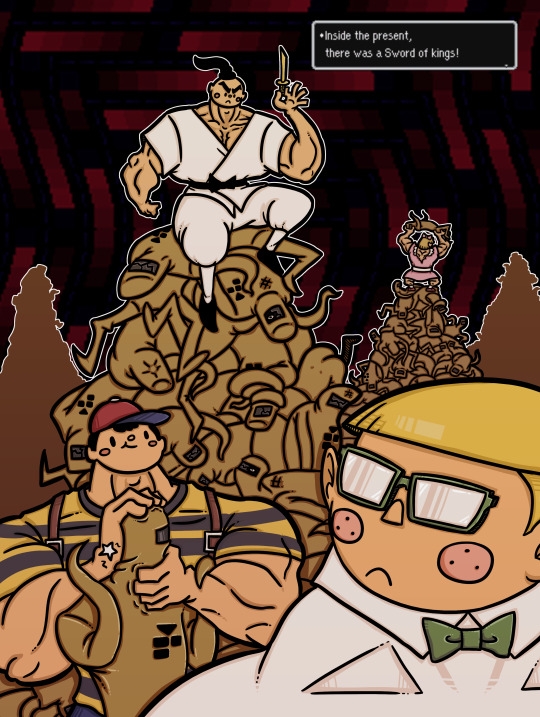Text
121K notes
·
View notes
Text
The International Court of Climate Justice will be armed with improvised weapons
The International Court of Climate Justice will be armed with improvised weapons. They will carry rusty machetes, fashioned from twisted sections of I-beam, with ends wrapped in soft plastic and electrical tape to make a handle. They will hold spears made from broom handles and broken glass bottles in their hands as they pass judgments from the top of cracked, crooked multi-level parking lots.
They forge paths across a changed landscape with outdated cartography, clutching faded printouts from Google Maps that fail to reflect where water has come, where water has gone, and where it has removed roads in the course of those processes. They will stay in the lee of the terrain when storms come and stay in the shadows as much as they can when the storms go. They will eat mostly carbohydrates, made from the tenacious superstrains of wheat that cling to life in soil devoid of nutrients and bare of moisture — hardy stalks engineered to be resilient and adaptive and to mature quickly and to propagate even faster. They will pass little other plant or animal life.
They will have lists, scribbled with notes. Rumours. Tips. Vague recollections. Landmarks. The International Court of Climate Justice will hogtie octogenarian former employees of Shell and Exxon and Chevron and BHP Billiton. Executives who commissioned reports into climate trends and ignored them, kept them secret. Marketers and lobbyists who spun and misdirected and winked and smiled and put money in the right hands. Politicians who absorbed the interests of these companies into their ideologies will kneel helpless before the Court, breathing short and shallow breaths through hessian hoods that smell like rust.
They will hunt them down. In the basements of abandoned supermarkets and in storm shelters and in caves and in old missile silos converted to complexes that are somewhere between apartments and doomsday bunkers, they will hunt down once millionaires and once billionaires. CEOs and spokespeople and authors and television hosts. The memory of the International Court of Climate Justice is long for denialists and those that equivocated.
There are no juries in the International Court of Climate Justice. Those who would be jurors are dead. There are no lawyers, either, in the International Court of Climate Justice. There are judges; many of them. As many as can follow them. And they are armed.
32 notes
·
View notes
Text
Numbers
Well this is just fucking typical. Handsome Makim comes up with a new system of counting and everyone loves it. I come up with a new system of counting and I am treated the same way that Urlk was when he had too much fermented grain paste and broke all of the pottery in the storehouse.
So we’re sitting around the fire, eating some goat and some bread and talking about how good cultivating crops is when Makim clears his throat.
“So, I’ve had an idea,” he says in his aggressively charismatic way. “About numbers.”
I’m not rude. I’m not an asshole. I place the bit of goat I’m working on back into my earthenware bowl (which I made myself, by the way) and listen attentively. I’ll admit, the idea is not terrible.
“So, you know how we count things and we have a word for all the numbers of things there are until it gets to too many and then we run out of words?” We all nod, somewhat sceptical of where this is going but, at the same time, all too familiar with what happens if you need to keep going after you reach sklebin. “Well, what if when you got to too many numbers you added a word and then started again?”
If anyone other than handsome Makim had said this, we would have laughed and gone straight back to shooting the shit about sedentary agriculture and how cool having a permanent supply of food is.
“So it would go like this, I think. You go one. Then two. Then three. Four. Five. Six. Seven. Eight. Nine. Ten.” So far, pretty routine, but there’s a twist: “Then you go ten-and-one. Ten-and-two. Ten-and-three. Ten-and-four. And so on.”
“What happens when you get to ten-and-ten?” asks Urlk, speaking up with a surprising amount of confidence for someone who not so recently broke all of the pottery in the storehouse.
“Urlk, I am so glad you asked,” Makim replies. “After ten-and-nine is two-of-ten. After that is two-of-ten-and-one”
A hushed silence falls over us. Even old Yuhe, who talks to herself and laughs for no reason, briefly suspends aggressively poking the hot coals with a stick to listen. This is impressive stuff. The implications are nothing short of staggering.
Now, I’m not trying to say Makim’s idea is bad. It’s great. I love it. I’ll be the first to admit that I am thrilled at the prospect of being able to count higher than sklebin. Everyone should keep in mind that I banged the leg bone of a goat against one of the sitting logs in excitement just as much as everyone else did.
I just think it could be improved, and I say this in, frankly, the politest terms possible.
“Makim,” I say. “Handsome Makim, the most upright person in all of the settlement.” Appreciative nods of agreement pass around the fire circle. “I love this. I really do. Numbers bigger than sklebin! What a concept!”
Makim smiles, patiently and handsomely, like a complete creep.
“I was just thinking that, maybe, instead of the big number being ten, it could be, uh, nine.”
I see a lot of looks of confusion. All of the excitement whipped up just because Makim may have revolutionised our system of counting and also happens to have a largely hairless upper face has abated with a speed that I find confusing and, honestly, a little hurtful.
“So, uh. You know. Seven. Eight. Nine. Nine-and-one. Nine-and-two. And so on.”
Handsome Makim, who thinks that his idea is so perfect that there’s no way anyone else could improve upon it, looks at me with the sort of disgusting, charitable tolerance that makes me want to throw up some goat straight into my earthenware bowl.
“Oh, uh,” Makim says, smiling beatifically, like a fuckhead would. “Well I– I guess we could, you know, have a play around with it.”
Those are the words that his mouth says but his eyes tell a different story. A story about how good the number ten is, and how we should use it to underpin a positional counting system, and how he is the sexiest genius in all of the plains for coming up with it.
At this point I’m getting stares from everyone, just for having different ideas. Even A’at, who is over sklebin years old and still doesn’t know how to weave a net properly, is looking at me like I suggested we should start throwing spears with the not-pointy end first.
“But… why?” Asks A’at. “Ten is a good number. Ten fingers. Ten toes. Handsome Makim’s idea just feels right.”
Handsome Makim looks at A’at in his characteristic fashion, warmly and gratefully, but without any hint of being insincerely obsequious. The absolute bastard. Everyone is nodding, like I’m some sort of prick for having my own feelings on an issue.
“Well, yes,” I say. “Yes, I can see that argument. I can see how you would arrive at that idea, at first. But that doesn’t mean we can’t refine it.
“You might like the sound of ten as the big number — just as beautiful, strong, handsome Makim suggests — because it comes very naturally to us and is a very visible part of our body. Sure. But what’s so good about counting to ten?
“You know what I like? Counting to nine. Much easier to count to. I’m already a bit tired by the time I get to eight!”
For a second I think that maybe Chiwe might have nodded in agreement with me but he was simply trying to dislodge a moth that had worked its way into his face hair. Otherwise I am met with the complete stillness and silence usually seen in prey animals about to ambush food animals.
“Maybe we can put it to a vote,” Makim says. “Would that be constructive?”
Oh ho. Very generous of you, handsome Makim. Sure, let’s put it to the group of simpleton settlement dwellers who are starstruck by your incredible posture and unobtrusive forehead bone. That’s very fair. Hell, why not just decide based on a handsomeness contest. Why not do that.
In the interest of being the bigger person, I go along with it. We put it to a vote. With the exception of one abstention, everyone votes in favour of Makim’s idea, and the abstention is only because Yuhe doesn’t understand what we are doing. Cool. Great.
Well done, handsome Makim. I hope this makes you feel good. We could have been the most advanced settlement on the plains, with a visionary nine-based counting system but, no, you had to set us back, all because of your gorgeous eyes and powerful calves.
I will have the last laugh, handsome Makim. Let’s see how long this idea of yours actually lasts.
23 notes
·
View notes
Photo

Finally found “Sword of Kings”
Now all my characters are above level 80…
Time to grasp the true form of Giygas’ attack
3K notes
·
View notes
Text
tumblr meme culture is really just a form of neo dadaism
319K notes
·
View notes
Link
0 notes
Link
0 notes
Link
0 notes
Link
2 notes
·
View notes
Link
0 notes
Photo










WOW. Watch these 3 minutes from Dallas sportscaster Dale Hansen talking about what Trump doesn’t understand about the national anthem and the right to protest. Compare this to any right-wing media whining and that’s why this is one to remember.
134K notes
·
View notes
Link
1 note
·
View note
Quote
“We've ended the war on beautiful, clean coal, and it's just been announced that a second, brand-new coal mine, where they're going to take out clean coal — meaning, they're taking out coal, they're going to clean it — is opening in the state of Pennsylvania,” Trump said, completely misrepresenting what clean coal is.
As Trump ranted and rambled in Phoenix, his crowd slowly thinned - The Washington Post
0 notes
Quote
In a decade, state legislatures will start filling up with Gamergaters, MRAs, /pol/ posters, Anime Nazis, and Proud Boys. These are, as of now, the only people in their age cohort becoming more active in Republican politics in the Trump era. Everyone else is fleeing.
Charlottesville Was a Preview of the Future of the Republican Party
0 notes
Text
I guess I had so completely absorbed the prevailing wisdom that I expected people in bankruptcy to look scruffy or shifty or generally disreputable. But what struck me was that they looked so normal.
The people appearing before that judge came in all colors, sizes, and ages. A number of men wore ill-fitting suits, two or three of them with bolero ties, and nearly everyone dressed up for the day. They looked like they were on their way to church. An older couple held onto each other as they walked carefully down the aisle and found a seat. A young mother gently jiggled her keys for the baby in her lap. Everyone was quiet, speaking in hushed tones or not at all. Lawyers – at least I thought they were lawyers – seemed to herd people from one place to another.
I didn’t stay long. I felt as if I knew everyone in that courtroom, and I wanted out of there. It was like staring at a car crash, a car crash involving people you knew.
Later, our data would confirm what I had seen in San Antonio that day. The people seeking the judge’s decree were once solidly middle-class. They had gone to college, found good jobs, gotten married, and bought homes. Now they were flat busted, standing in front of that judge and all the world, ready to give up nearly everything they owned just to get some relief from the bill collectors.
As the data continued to come in, the story got scarier. San Antonio was no exception: all around the country, the overwhelming majority of people filing for bankruptcy were regular families who had hit hard times. Over time we learned that nearly 90 percent were declaring bankruptcy for one of three reasons: a job loss, a medical problem, or a family breakup (typically divorce, sometimes the death of a husband or wife). By the time these families arrived in the bankruptcy court, they had pretty much run out of options. Dad had lost his job or Mom had gotten cancer, and they had been battling for financial survival for a year or longer. They had no savings, no pension plan, and no homes or cars that weren’t already smothered by mortgages. Many owed at least a full year’s income in credit card debt alone. They owed so much that even if they never bought another thing – even if Dad got his job back tomorrow and Mom had a miraculous recovery – the mountain of debt would keep growing on its own, fueled by penalties and compounding interest rates that doubled their debts every few years. By the time they came before a bankruptcy judge, they were so deep in debt that being flat broke – owning nothing, but free from debt – looked like a huge step up and worth a deep personal embarrassment.
Worse yet, the number of bankrupt families was climbing. In the early 1980s, when my partners and I first started collecting data, the number of families annually filing for bankruptcy topped a quarter of a million. True, a recession had hobbled the nation’s economy and squeezed a lot of families, but as the 1980s wore on and the economy recovered, the number of bankruptcies unexpectedly doubled. Suddenly, there was a lot of talk about how Americans had lost their sense of right and wrong, how people were buying piles of stuff they didn’t actually need and then running away when the bills came due. Banks complained loudly about unpaid credit card bills. The word deadbeat got tossed around a lot. It seemed that people filing for bankruptcy weren’t just financial failures – they had also committed an unforgivable sin.
Part of me still wanted to buy the deadbeat story because it was so comforting. But somewhere along the way, while collecting all those bits of data, I came to know who these people were.
In one of our studies, we asked people to explain in their own words why they filed for bankruptcy. I figured that most of them would probably tell stories that made them look good or that relieved them of guilt.
I still remember sitting down with the first stack of questionnaires. As I started reading, I’m sure I wore my most jaded, squinty-eyed expression.
The comments hit me like a physical blow. They were filled with self-loathing. One man had written just three words to explain why he was in bankruptcy:
Stupid.
Stupid.
Stupid.
When writing about their lives, people blamed themselves for taking out a mortgage they didn’t understand. They blamed themselves for their failure to realize their jobs weren’t secure. They blamed themselves for their misplaced trust in no-good husbands and cheating wives. It was blindingly obvious to me that most people saw bankruptcy as a profound personal failure, a sign that they were losers through and through.
Some of the stories were detailed and sad, describing the death of a child or what it meant to be laid off after thirty-three years with the same company. Others stripped a world of pain down to the bare facts:
Wife died of cancer. Left $65,000 in medical bills after insurance.
Lack of full-time work – worked five part-time jobs to meet rent, utilities, phone, food, and insurance.
They thought they were safe – safe in their jobs and their lives and their love – but they weren’t.
I ran my fingers over one of the papers, thinking about a woman who had tried to explain how her life had become such a disaster. A turn here, a turn there, and her life might have been very different.
Divorce, an unhappy second marriage, a serious illness, no job. A turn here, a turn there, and my life might have been very different, too.
– A Fighting Chance by Elizabeth Warren, pg. 34 - pg. 36
(Bolding mine)
55K notes
·
View notes
